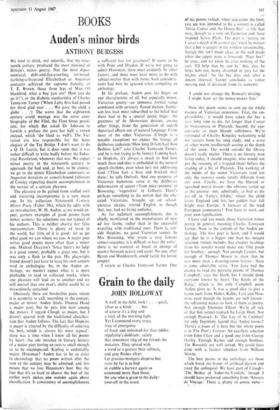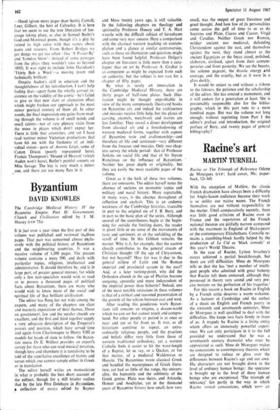Auden's minor birds BOOKS
ANTHONY BURGESS
We tend to think, not unjustly, that the nine- teenth century produced the most minimal of Britain's minor poetry. Not the most dipso- maniacal, debt-and-lice-crawling, rot-nosed, farthing-a-thousand Elizabethan or Augustan poetaster achieved the supreme banality of T. E. Brown, those three legs of Man CO blackbird, what a boy you are! How you do go it!'), or the diabetic saccharinity of Charles Tennyson Turner (When Letty first had passed her third glad year . . . We gave the child a globe . . .'). The worst that the eighteenth century could manage was the verse auto- biography of Bet Flint, the Fleet Street prosti- tute, for which Bet asked Dr Johnson to furnish a preface (he gave her half a crown instead, which 'she liked as well). The Vic- torian era was responsible for the Scots elegiast of the Tay Bridge. I don't want to do a Q. D. Leavis, but it does seem that it was rather difficult to write badly before the Indus- trial Revolution, whenever that was. We expect minor poetry in the nineteenth century to approach the bad and, at best, to be clumsy; we go to the minor Elizabethan sonneteers or Augustan moralists or conceit-bound followers of Cowley expecting decent accomplishment in the service of a certain pleasure.
The pleasure to be gained from stuffed owls and stuttering incompetence is a very mean one. In his collection Nineteenth Century Minor Poets (Faber 50s), which he edits with an introduction, W. H. Auden, as we would ex- pect, garners examples of good poems from minor writers: his selections are not typical of his authors. This is neither charity nor false representation. There is plenty of verse in the world, but little of it is good: let us get what good we can where we can. A major poet writes good poems more often than a minor one. Michael Drayton's 'Since there's no help' is a good sonnet, probably a great one, but it was only a flash in the pan. His playwright friend doesn't just have to have his own sonnets read in anthologies. So, in the Auden an- thology, we mustn't expect what it is more profitable to read in collected works, where one pleasure will lead on to another and we will marvel that one man's ability could be so miraculously sustained.
Obviously there are borderline poets whom it is eccentric to call, according to the context, major or minor. Auden thinks Thomas Hood a major poet, but he puts him here among the minors. I regard Clough as major, but I daren't quarrel with the .traditional classifica- tion that Auden follows. The fact that Hopkins is major is attested by the difficulty of selecting his best, which is always his most typical : there was a time when I knew all his poems by heart—the one instance in literary history of a major poet having an oeuvre small enough, so to be encompassed. Kipling is undeniably, major. Housman? Auden has to be so strict in chronology that no poem written after the turn of the century may be admitted, and this means that we lose Housman's best. But the fact that it's so hard to choose the best of the earlier, work makes one wonder again about classification. Is consistency of accomplishment, a sufficient test for greatness? It seems to be with Pope and Dryden. If we're not going to admit Housman, there must evidently be other factors, and these must have more to do with subject-matter than with form. Such considera- tions had best be ignored when compiling an anthology.
In his preface, Auden puts his finger on one characteristic of all, but especially minor, Victorian poetry—an immense formal range combined with seriously flawed diction. Tenny- son less than most subscribed to the belief that there had to be a special poetic lingo: the greatness of In Metrtoriatn derives, among other things, from the generation of superb rhetorical effects out of natural language. From most of the other Victorians (Clough is a notable exception) we expect the liturgy of deliberate archaism (Wow long,0 lion,hast thou fleshless lain?' asks Charles Tennyson Turner. and he is not trying to be funny). Coming back • to Hopkins, it's always a shock to find how much thou-and-thee is embedded in the natural speech-rhythms, even when he's not addressing God (`Thou hast a base and brickish skirt there,' he tells Oxford). And one property of Victorian humorous verse is the deliberate deformation of accent ('from mice/promise' in Browning; 'vegetables' in Gilbert). There's perhaps something in the notion that the edu- cated Victorians, brought up on school- exercise alcaics, treated English as though that, too, had no living audience.
As for technical accomplishment, this is chiefly manifested• in the manufacture of new ad hoc forms, rather than in the successful wrestling with traditional ones. There is, out- side Hopkins, no good Victorian sonnet. In Mrs Browning, who wrote a very famous sonnet-sequence, it is difficult to hear the volta: there is no contrast or break or change of nuance between octave and sestet. No one, after Byron and Wordsworth, could tackle the heroic couplet.
I return to Charles Tennyson Turner. One
of his poems (which, when you count the lines, you see was intended to be a sonnet) is called 'Julius Caesar and the Honey-Bee'—a title that may, though to a very un-Turnerian end, have inspitid Sylvia Plath. The poet is 'poring on Caesar's death with earnest eye' when he notices that a bee is caught in the window (presumably, though this isn't made clear, in the well made when the upper pane is lowered). 'Poor bee!' he cries, and we know he cries nothing of the sort, 'I'll help thee by and by.' But, alas, he helps him not, being absorbed in 'pity for the mighty chief.' So the bee dies and, after a decent interval, Turner concludes (a rather moving end, if divorced from its context):
'I could not change the Roman's destiny; I might have set the honey-maker free.'
Now this poem seems to sum up the whole essence of Victorian minorness. First, the im- plausibility: it would have taken the bee a very long time to die, far longer than Caesar in Shakespeare or Plutarch. Second, the ego- ceruricity or sheer bloody selfishness. We're reminded of Charles Kingsley welcoming wild nor'-easters from his snug study, and a score of other warm intellectuals cooing at the depth of the snow. The world outside the library doesn't really matter. There is no literary man living today, I should imagine, who would not put the rescuing of a trapped insect before the reading of a bit of Plutarch. The working of the minds of the minor Victorians (and not only the minors) seems totally different from our own. Finally, we have the blurred or squashed moral lesson—the obvious tarted up as the gnomic--not, admittedly, as bad as the pas-off in 'Letty's Globe,' where the child kisses England and lets her golden hair fall bright over Europe. A forecast of the total European community? You have to work out your own signification.
I have said too much about Victorian minor poetry in general, meaning Charles Tennyson Turner. Now to the content of the Auden an- thology. The first poet is Scott, and I would say that he is a bigger one than his meagre selection (which includes five chapter headings from his novels) would make out. One poem for Southey : enough. Not enough Landor, but enough of Thomas Moore to show that he was more than a drawing-room lyricist : there is some admirable satire. 'Few have had the chance to read the patriotic poems of Thomas Campbell.' says the blurb, but I should think everyone knows by heart 'The Battle of the Baltic,' which is the only Campbell poem Auden gives us. It was a good idea to give a hymn each from Heber, Keble, Lyte and New- man, evert though the hymns are well known: the reframing makes us look at them as poetry. Not enough Ebenezer Elliott. We're all sick of that fish sonnet-triptych by Leigh Hunt. Not enough Peacock. Is The Lay of St Cuthbert' the only Ingoldsby legend that Auden knows? There's a piece of it here but the whole poem is in The Poet's Tongue. An excellent selection from John Clare and a good one from George Darley. Enough Barnes and enough Beddoes. The Rossettis are well served. We could have done' with a fresher selection from William Morris.
The best poems in the anthology are those which break the bonds of artificial diction and essay the colloquial. We have part of Clough's The Bothie of Tober-na-Vuolich,' though I should have preferred something from 'Amours de Voyage.' There is p!enty of comic verse--
—Hood (given more pages than Scott), Carroll, Lear, Gilbert, the best of Calverley. It is here that we seem to see the true liberation of lan- guage taking place, as also in Samuel Butler's God-and-Montreal poem, though it's a pity he ruined its high satire with that stanza about pants and trousers. From Robert Bridges we get things we get too often—like 'A Passer-By' and 'London Snow'—instead of some passages from the plays (they wouldn't take us beyond 1893). It was right to include John Davidson's 'Thirty Bob a Week'—a moving poem and technically brilliant.
Despite Auden's skill in selection and the thoughtfulness of his introduction, I can't help feeling that—apart from the wholly correct in- sistence on the validity of the comic—he's failed to give us that new slant or alienation effect which might freshen our approach to the most minor poetical century of them all. in other words, the final impression one gains from read- ing through the volume is of small minds and small talents—not of rare plenary visits from the muse in places which don't expect her. There is little that astonishes, and yet I have read various minor Victorian productions that have hit me with the freshness of an indi- vidual vision—parts of Aurora Leigh, some of Canon Dixon (poorly represented here), Francis Thompson's 'Hound of Heaven' (which Auden won't have), Butler's painful sonnets on Miss Savage. The key is very much a minor one, and there are too many flats in it.































 Previous page
Previous page